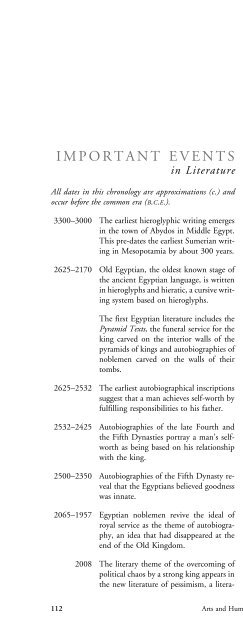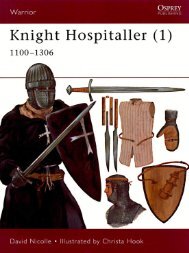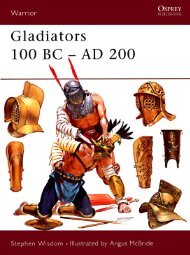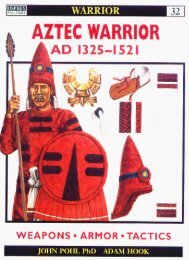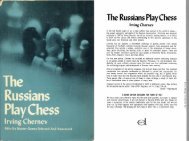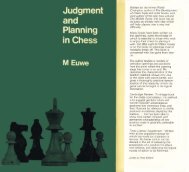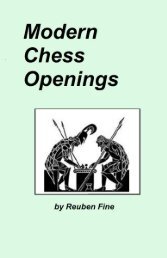Through the Eras
Edward Bleiberg ed., Ancient Egypt (2675-332 ... - The Fellowship
Edward Bleiberg ed., Ancient Egypt (2675-332 ... - The Fellowship
You also want an ePaper? Increase the reach of your titles
YUMPU automatically turns print PDFs into web optimized ePapers that Google loves.
ture that contrasts earthly reality withEgyptian ideals.2008–1630 Middle Egyptian, <strong>the</strong> classical stage of <strong>the</strong>ancient Egyptian language used to composepoetry and prose for nearly 1,500years, is also <strong>the</strong> spoken language.IMPORTANT EVENTSin LiteratureAll dates in this chronology are approximations (c.) andoccur before <strong>the</strong> common era (B.C.E.).3300–3000 The earliest hieroglyphic writing emergesin <strong>the</strong> town of Abydos in Middle Egypt.This pre-dates <strong>the</strong> earliest Sumerian writingin Mesopotamia by about 300 years.2625–2170 Old Egyptian, <strong>the</strong> oldest known stage of<strong>the</strong> ancient Egyptian language, is writtenin hieroglyphs and hieratic, a cursive writingsystem based on hieroglyphs.The first Egyptian literature includes <strong>the</strong>Pyramid Texts, <strong>the</strong> funeral service for <strong>the</strong>king carved on <strong>the</strong> interior walls of <strong>the</strong>pyramids of kings and autobiographies ofnoblemen carved on <strong>the</strong> walls of <strong>the</strong>irtombs.2625–2532 The earliest autobiographical inscriptionssuggest that a man achieves self-worth byfulfilling responsibilities to his fa<strong>the</strong>r.2532–2425 Autobiographies of <strong>the</strong> late Fourth and<strong>the</strong> Fifth Dynasties portray a man’s selfworthas being based on his relationshipwith <strong>the</strong> king.2500–2350 Autobiographies of <strong>the</strong> Fifth Dynasty revealthat <strong>the</strong> Egyptians believed goodnesswas innate.2065–1957 Egyptian noblemen revive <strong>the</strong> ideal ofroyal service as <strong>the</strong> <strong>the</strong>me of autobiography,an idea that had disappeared at <strong>the</strong>end of <strong>the</strong> Old Kingdom.2008 The literary <strong>the</strong>me of <strong>the</strong> overcoming ofpolitical chaos by a strong king appears in<strong>the</strong> new literature of pessimism, a litera-1938–1759 New literary genres appear including narrative,teachings, and discourses.1919–1875 The Story of Sinuhe, Egypt’s great nationalepic poem is probably composed duringthis time.1543–1539 The Kamose Stela, <strong>the</strong> oldest known historicalaccount, is composed; <strong>the</strong> genrewill grow in importance during <strong>the</strong> NewKingdom.1539–1075 Late Egyptian, <strong>the</strong> language of a numberof sophisticated prose stories, is also <strong>the</strong>spoken language.Autobiography grows less important as aform than it was in <strong>the</strong> earlier period andis published on statues ra<strong>the</strong>r than ontomb walls.Hymns emerge as an important literaryform.1479–1425 The Annals of Thutmose III, carved on <strong>the</strong>wall of <strong>the</strong> Temple of Amun at Karnak,directs readers to a lea<strong>the</strong>r roll in <strong>the</strong> libraryfor <strong>the</strong> full version of <strong>the</strong> text, indicatingthat fuller versions of some textsexisted in o<strong>the</strong>r media.A poem praising <strong>the</strong> city of Thebes is <strong>the</strong>only known Eighteenth-dynasty verse,contrasting with numerous poems of earlierand later periods.1478–1458 Queen Hatshepsut publishes an historicalaccount of her expedition to <strong>the</strong> land ofPunt in Ethiopia, a very early descriptionof a foreign country.1390–1352 King Amenhotep III uses large faiencescarabs to publish and distribute decreesand information, one way of producingmultiple copies of a text with molds.112 Arts and Humanities <strong>Through</strong> <strong>the</strong> <strong>Eras</strong>: Ancient Egypt (2675 B.C.E.–332 B.C.E.)


